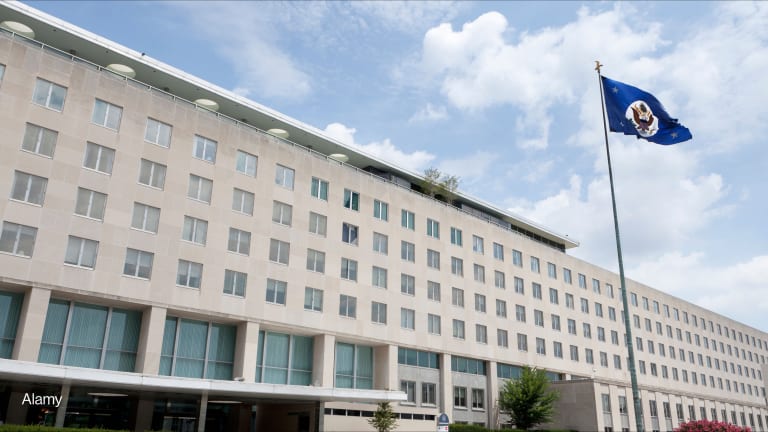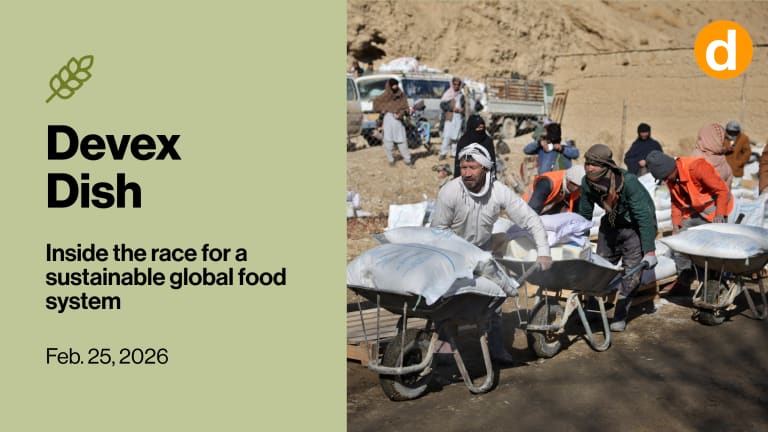USAID's merger with the State Department: The pros, cons, and questions
Last month, the government told Congress it plans to “abolish” the agency entirely, moving some of its humanitarian, global health, and “limited national security” programs to the State Department. What does that all mean?
What is the investment thesis for merging the U.S. Agency for International Development and the Department of State? That’s the question four panelists tangled with at a Devex Pro briefing on Monday, which centered on the pros, cons, and questions surrounding the Trump administration’s dismantling — and subsequent subsummation — of USAID. Last month, the government told Congress it plans to “abolish” the agency entirely, moving some of its humanitarian, global health, and “limited national security” programs to the State Department. “That’s not to say all mergers are bad ideas, and many mergers do create lots of great value. But you really have to have, what we would call in the private sector, an investment thesis,” said Richard Crespin, a senior associate at the Center for Strategic and International Studies and the CEO of CollaborateUp. “And I don’t quite understand just yet what the investment thesis here is, other than to bring USAID under control.” A merger goes against a decision made by the U.S. government decades ago. Twelve years after USAID was created, the Foreign Assistance Act of 1973 made it clear: USAID needed more independence from the State Department. “The functions of the two organizations of diplomacy and development were so different, and having people in the same office created tensions, lots of disagreements, and inability for each to do their operations properly that they ended that experiment,” said George Ingram, a senior fellow at the Brookings Institution. “That’s an important lesson.” “A reorganization of this magnitude has major national security implications. It’s not something that should be rushed through without quite a bit of congressional involvement.” --— Tod Preston, executive director, Modernizing Foreign Assistance Network But now, the pendulum has swung the other way. After months of program and staff terminations, USAID’s Bureaus for Humanitarian Assistance and Global Health will be “realigned” to relevant State Department entities — and all other USAID programs that duplicate the work of the State Department will be eliminated. Crespin provided some context: For many in the Trump administration, it felt like foreign policy and foreign assistance were out of alignment — and they needed to be brought back into alignment to serve America’s interests. And while the government has identified some of its priorities — for example, Crespin said, the Trump administration has given lifesaving humanitarian aid more weight — the “how” of the plan has yet to be formulated. “It was overly simplistic,” said Marcia Wong, the former deputy assistant administrator of USAID’s humanitarian assistance bureau, referring to the congressional notification. “I don't know if that gives me any better confidence that this quote, merger — or what I call subsuming — of USAID is going to be a well-thought-through and executed process.” For Wong, that’s in part due to how the last two months have played out: Ever since Donald Trump returned to the White House, it’s been week after week of chaos and confusion at USAID. For Ingram and Crespin, it’s because of the differences between development and diplomacy, and the skill sets needed for each. And for Tod Preston, the executive director of the Modernizing Foreign Assistance Network, or MFAN, that’s also because of capacity — and the fact that one of the offices meant to survive at the State Department, the Office of Food Security, has just 12 people left today. Most of USAID’s staff have been placed on administrative leave or are on their way to being fired from the agency, hollowing out a workforce that once numbered more than 13,000 across the world. “A reorganization of this magnitude has major national security implications,” said Preston. “It’s not something that should be rushed through without quite a bit of congressional involvement.” That’s not to say such involvement isn’t happening. Ever since the notification was sent to Congress, lawmakers have had 15 days to respond to the document. In theory, Congress could put a hold on that notification — but there are two caveats with that potential outcome. The first, Preston explained, is because even though Jeanne Shaheen, the top Democrat on the Senate Foreign Relations Committee, placed a hold on the notification last Friday, it’s unlikely that such a move would be honored by the Trump administration. And second, Preston added, is that lawmakers like Brian Mast — the top Republican on the House’s mirroring committee — are unlikely to block the administration’s plans. There’s also the potential for cuts to come for the 2025 fiscal year, he explained, with most expecting that the administration will either impound existing funds or come forward with an official rescission proposal to Congress to claw back some allocated money. “There are a number of ways that Congress can assert its role and its influence,” said Preston. “And unfortunately, that has not happened thus far.” All that being said, Congress hasn’t necessarily been quiet, Preston added. He described “growing frustration” on both the Republican and Democratic sides of the aisle with the Trump administration’s lack of consultation and engagement with Congress on foreign aid. But for many (including our Devex Pro members), that’s left a resounding question: Is this proposal — and the weeks of dissolution to date — just a means to the end of U.S. foreign assistance entirely? “We don’t know what they’re going to do with these programs that have been canceled, and whether or not any of them are going to be revived or re-competed,” said Ingram. “There’s just no indication as to what the plan is.” Wong mentioned that in recent days, 36 programs were terminated — despite being previously cleared to remain active at the State Department. She expected that going forward, foreign assistance will be “very transactional” and “very controlled.” “What are the implications of these rapid and severe cuts and further destabilization?” Wong added. “Is it all going to be law enforcement? Is it all going to be migration management? What is the construct? When you do severe cuts like that, you’re only going to add instability to severely stressed contexts.”
What is the investment thesis for merging the U.S. Agency for International Development and the Department of State?
That’s the question four panelists tangled with at a Devex Pro briefing on Monday, which centered on the pros, cons, and questions surrounding the Trump administration’s dismantling — and subsequent subsummation — of USAID. Last month, the government told Congress it plans to “abolish” the agency entirely, moving some of its humanitarian, global health, and “limited national security” programs to the State Department.
“That’s not to say all mergers are bad ideas, and many mergers do create lots of great value. But you really have to have, what we would call in the private sector, an investment thesis,” said Richard Crespin, a senior associate at the Center for Strategic and International Studies and the CEO of CollaborateUp. “And I don’t quite understand just yet what the investment thesis here is, other than to bring USAID under control.”
This story is forDevex Promembers
Unlock this story now with a 15-day free trial of Devex Pro.
With a Devex Pro subscription you'll get access to deeper analysis and exclusive insights from our reporters and analysts.
Start my free trialRequest a group subscription Printing articles to share with others is a breach of our terms and conditions and copyright policy. Please use the sharing options on the left side of the article. Devex Pro members may share up to 10 articles per month using the Pro share tool ( ).
Elissa Miolene covers U.S. foreign assistance from Washington, D.C. She previously covered education at The San Jose Mercury News, and has written for The Wall Street Journal, the San Francisco Chronicle, and other news outlets across the world. Before shifting to journalism, Elissa led communications for aid agencies in the United States, East Africa, and South Asia.








